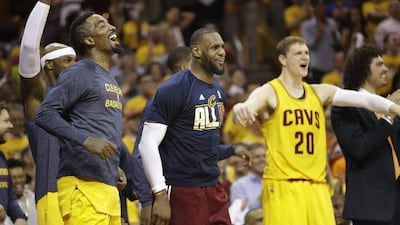On January 5 the Cleveland Cavaliers suffered one of their more egregious defeats of the season, a 95-92 pratfall at the purposefully bad Philadelphia 76ers.
Their record fell to 19-16, LeBron James had been looking listless through much of the year and Kevin Love looked lost.
The grand Big 3 experiment hashed out in James’s return to the Cavaliers seemed to be failing.
Whether out of panic in losing to the 76ers, a weeks-long consideration that Cleveland had been less than the sum of its parts or some other motivation, that was the day the Cavs made the first of two trades that wound up altering their season.
Read more:
– LeBron James, always so reliable, returns Cavaliers to NBA Finals
The deals did not seem important, at the time. Depth is important to any title contender, but top-end talent is what makes a contender. The Cavs already had that. They had LeBron James. They would be just fine.
Still, the reinforcements, first JR Smith and Iman Shumpert in a three-team deal with New York and Oklahoma City, and then Timofey Mozgov from Denver a few days later, proved their worth.
The Cavaliers bottomed out at 19-20 on January 13 but were 32-9 the rest of the way.
In the play-offs, those trades are proving even more consequential.
Love’s absence and Kyrie Irving’s assortment of ailments would have left James disastrously unsupported without the January reinforcements.
Smith, in particular, has been valuable. The erratic scorer has supplied a handy 13.5 points per game in the play-offs, shot a dependable 39.6 per cent from three and been on fire in a few key moments.
Shumpert has scored just over 10 a game, shooting 36.8 per cent from three and playing solid defence. Mozgov has been a steadying presence in the middle, with about nine points and seven rebounds per contest.
Injuries are the one great variable in the NBA. Health can be the difference between a title and a forgettable exit.
But teams can plan ahead. The Cavaliers came up with a contingency plan back in January that just may deliver them a championship in June.
jraymond@thenational.ae
Follow us on Twitter @NatSportUAE

